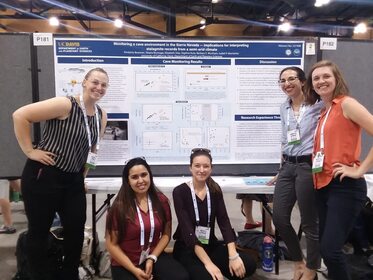 In honor of the Geologic Society of America 2020 conference starting today, I thought I’d start a series of blog posts about mentoring undergrads through the conference process. You’ll notice that I actively mentor students through every part of the conference experience. Why? Because not doing so is completely unequitable. By leaving undergrad scientists to “figure it out” you are assuming a lot about that students’ background. Maybe you and the student will get lucky and they will figure it out – but they may not. Mentoring a student will lead to them getting more out of the conference, will make it cheaper on your grant, will lead to a better experience for them, and will hopefully lead to more opportunities for your student. The first part of getting undergrads to a conference is finding a conference and paying for it. In my lab group, we are lucky to have funding to pay for undergraduates to attend conferences. If you don’t have funding for undergrads to attend, you need to make that very clear to them before you encourage them to submit an abstract. Make sure you find a conference that the student could afford it or that has a reasonable chance for student funding, make sure the conference is close or in a cheap location (or virtual), and make sure that you have exhausted all potential ways to fund the experience through the department or through a society. This is crucial because a conference can cost a couple of thousand dollars when all is said and done, and you don’t want that to fall on the student without them knowing. Some great conferences for students are the SACNAS conference, the GSA section meetings, and the AGU topical meetings. Smaller meetings are often cheaper and create more opportunities for students to get one-on-one time with companies or schools that are recruiting. My first conference, the GSA south-central section meeting was exactly like this, I had a one-on-one meeting with someone from Chevron and a research group from the U of Auburn. I haven’t experienced that kind of close contact with recruiters since then. When you have found a meeting, make sure you have a plan for how the student can do things for free, where they can stay, how they’ll get there, etc (especially if you don’t have a grant to pay for it). If the conference is within driving distance, maybe you can save by all piling into a university vehicle and driving yourselves (I’ve heard of many private institutions covering this type of cost). If the conference is near where your student is from, maybe they can stay with family or friends to cut down on hotel costs. If the conference has a volunteer program, this may be a good opportunity to cut down on the cost of registration (Goldschmidt is very good at this). When I was an undergrad, I did all of these things so that my cost would be as low as possible. Additionally, many conferences have fellowship programs, make sure you are aware of them so that you can encourage students in your lab to apply. Finally, even if you are in a lucky situation like mine, and your lab has money for undergraduates to go to conferences, it can still be difficult and painful to navigate the administrative process to doing so. Make sure you begin working with the front office early if there is an undergrad who wants to go to a conference. In my experience, the more time the administrators have to speak to each other and make a plan, the smoother everything will go. Take it from experience, do not treat undergrad reimbursements the same way you would treat your own and ask for forgiveness after the fact, make a plan early. Do not assume your students have credit cards and can absorb the cost of conferences ahead of time and can be reimbursed later. This is an unfair practice even for graduate students, but in my experience it’s impossible for undergrads. I’ve had undergrads who haven’t ever used a credit card before, certainly all of them didn’t have one at the time of registering for the conference, and even I didn’t have one until a few years into grad school. If you are around students who can do this, that’s great, include it in the plan, but don’t assume this is the case. Over the next couple of weeks, I’ll cover writing a conference abstract, navigating the conference experience, and networking 101! Good luck GSA presenters!
0 Comments
Leave a Reply. |
AuthorI am a Ph.D. Candidate who actively tries to create an equitable and enriching experience for undergraduate researchers, I post weekly about the things I teach and my experiences with undergraduates. Archives
August 2021
Categories
All
|
 RSS Feed
RSS Feed
